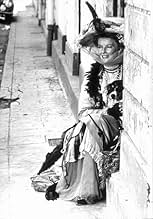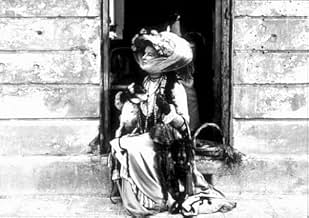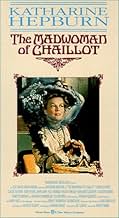CALIFICACIÓN DE IMDb
5.9/10
1.3 k
TU CALIFICACIÓN
Una condesa desafiante, creyendo que el bien debe vencer al mal, decide enfrentar a los corruptos y poderosos gobernantes de París.Una condesa desafiante, creyendo que el bien debe vencer al mal, decide enfrentar a los corruptos y poderosos gobernantes de París.Una condesa desafiante, creyendo que el bien debe vencer al mal, decide enfrentar a los corruptos y poderosos gobernantes de París.
- Dirección
- Guionistas
- Elenco
- Dirección
- Guionistas
- Todo el elenco y el equipo
- Producción, taquilla y más en IMDbPro
Opiniones destacadas
10ftparish
Lots of good comment already made except for some confusion over interpreting and understanding allegory. This is one of the best examples. Much has been said about the waste of talent by big name actors in this film. This play gives point to the old adage that there are no secondary parts in a play. This play demanded and used TALENT, hence the outstanding cast of true professionals. I was disappointed that there was no credit or reference made of the musical score. It is excellent. I'd buy a copy if I could find it. This music is haunting and will live with you for a long time. This is one of those movies that makes one wonder why it is not more prominently marketed. Maybe too cerebral?
The first hour of this film amazed me, it's a visual treat, especially the cafe scenes with Brynner, Pleasance et al talking weird, and Chamberlain and the whacky bomb-plot; towards the end it does tend to get a little bogged down in meaningfulness, the trial scene loses some impact from being overindulgent, but overall the Madwoman is a fascinating look at sixties idealism with eye opening performances from some top stars and enough zany weirdness in the script to keep a David Lynch fan happy. Well worth a look, in my book.
Question: In 1943 what movie starred Katherine Hepburn, Katherine Cornell, and Harpo Marx?
ANSWER: STAGE DOOR CANTEEN
Question: In 1969 what movie starred Katherine Hepburn, Dame Edith Evans, and Danny Kaye?
ANSWER: THE MADWOMAN OF CHAILLOT
Odd that Kate Hepburn should pop up in two unfair trivia questions, but it does happen. Actors do run into each other in all kinds of films, both good and bad, memorable and forgettable, and regular or short film (look at a comic short called THE STOLEN JOOLES which has most of the stars of Hollywood in the 1930s in it).
STAGE DOOR CANTEEN was done for patriotic morale boosting for our soldiers, and it celebrated the canteens used to entertain our men on furlough. So the making of that film had a reason that transcends it's current obscurity. I might add, as it is the only major movie that stage star Katherine Cornell popped up in for just a few minutes, it is worth it as a time capsule as such.
But THE MADWOMAN OF CHAILLOT was based on a Giraudoux play about modern society endangered by the forces of power and greed. It is about the discovery that the city of light, Paris, is reposing on a huge, untapped oil field, and that various power figures without any soul (Yul Brynner, Charles Boyer, Paul Henried, Oscar Holmolka, Donald Pleasance) may be able to empty the city of it's neighborhoods, it's citizens, it's life and light, and replace it with derricks. Giraudoux made sure that the villains represent everything that he suspects. Brynner is the ultimate ruthless billionaire (he is upset when a waiter accidentally spills water on him). Boyer is a stock broker. Henried is a General. Homolka is the French head of the Communist Party (Giraudoux has no illusions about what a political label means - there are power mad people in all political parties). Pleasance is a prospector for oil. There is also John Gavin as a right wing religious demagogue.
Opposed to these villains are Kate Hepburn (the leading local social figure from the past - called "the madwoman of Chaillot") and her friends Giulietta Massina, Margaret Leighton, and Edith Evans (who is still trying to campaign in 1969 for Mr. Wilson's League of Nations). Also aiding Hepburn are the "rag picker" (Danny Kaye - in the best dramatic performance in a major motion picture in his career - also his only Oscar nomination), Richard Chamberlain, Gordon Heath, and Nanette Newman. Although Hepburn, Massina, Leighton, and Evans have social position, none have the political clout of the villains. So when they are made aware of the threat to their beloved Paris (and by extension western culture and morality) they hold a trial (in absentia) of the villains, and find these villains have to die.
This film is better for the brief vignettes of it's stars than for the total impact. Brynner's malevolent, general ruthlessness is one of his best acting jobs. So is Henried's almost comical criminal activity: he confesses to having arranged the murder of four promising young aides of his, because he suspected one of them (but not knowing which) of sleeping with his wife - it turned out his wife had been faithful after all (Brynner, Boyer, Homolka, and Gavin congratulate him on his luck!). Kaye has several great set pieces - a rag picker he wraps eloquent about the great, glory days of garbage in the past where each neighborhood's garbage had a special character all it's own (as opposed to the garbage of the modern homogenized neighborhoods of Paris, that those villains forced on the citizens). He is superb in the scene where he is the "defense" counsel for Brynner and his group - demoniacally showing what these people are really like while "defending" them. All those comic, scatterbrained, sequences in his movies built up to these scenes of poetry and passion.
Hepburn, of course, was great - that last sequence where she mistakes Chamberlain for the lost love of her youth, and mournfully laments his loss, is a highpoint in her career. She rarely had so poetic a scene of tragic delicacy.
But the story, oddly enough, for all we may approve of the hatred shown for the powerful who use and discard us, is not fully acceptable. Henried's general is too stupid (he almost launches a missile attack on Russia while talking to Hepburn). Brynner is so impossibly arrogant that a consortium of his fellow billionaires would probably ruin him to shut him up. But the acting is still so good that it one can forget these minor problems. Any film where Donald Pleasance uses his prominent proboscis by putting it into a drinking glass to smell for oil cannot be all bad. So I'll give it a "6", if not higher.
ANSWER: STAGE DOOR CANTEEN
Question: In 1969 what movie starred Katherine Hepburn, Dame Edith Evans, and Danny Kaye?
ANSWER: THE MADWOMAN OF CHAILLOT
Odd that Kate Hepburn should pop up in two unfair trivia questions, but it does happen. Actors do run into each other in all kinds of films, both good and bad, memorable and forgettable, and regular or short film (look at a comic short called THE STOLEN JOOLES which has most of the stars of Hollywood in the 1930s in it).
STAGE DOOR CANTEEN was done for patriotic morale boosting for our soldiers, and it celebrated the canteens used to entertain our men on furlough. So the making of that film had a reason that transcends it's current obscurity. I might add, as it is the only major movie that stage star Katherine Cornell popped up in for just a few minutes, it is worth it as a time capsule as such.
But THE MADWOMAN OF CHAILLOT was based on a Giraudoux play about modern society endangered by the forces of power and greed. It is about the discovery that the city of light, Paris, is reposing on a huge, untapped oil field, and that various power figures without any soul (Yul Brynner, Charles Boyer, Paul Henried, Oscar Holmolka, Donald Pleasance) may be able to empty the city of it's neighborhoods, it's citizens, it's life and light, and replace it with derricks. Giraudoux made sure that the villains represent everything that he suspects. Brynner is the ultimate ruthless billionaire (he is upset when a waiter accidentally spills water on him). Boyer is a stock broker. Henried is a General. Homolka is the French head of the Communist Party (Giraudoux has no illusions about what a political label means - there are power mad people in all political parties). Pleasance is a prospector for oil. There is also John Gavin as a right wing religious demagogue.
Opposed to these villains are Kate Hepburn (the leading local social figure from the past - called "the madwoman of Chaillot") and her friends Giulietta Massina, Margaret Leighton, and Edith Evans (who is still trying to campaign in 1969 for Mr. Wilson's League of Nations). Also aiding Hepburn are the "rag picker" (Danny Kaye - in the best dramatic performance in a major motion picture in his career - also his only Oscar nomination), Richard Chamberlain, Gordon Heath, and Nanette Newman. Although Hepburn, Massina, Leighton, and Evans have social position, none have the political clout of the villains. So when they are made aware of the threat to their beloved Paris (and by extension western culture and morality) they hold a trial (in absentia) of the villains, and find these villains have to die.
This film is better for the brief vignettes of it's stars than for the total impact. Brynner's malevolent, general ruthlessness is one of his best acting jobs. So is Henried's almost comical criminal activity: he confesses to having arranged the murder of four promising young aides of his, because he suspected one of them (but not knowing which) of sleeping with his wife - it turned out his wife had been faithful after all (Brynner, Boyer, Homolka, and Gavin congratulate him on his luck!). Kaye has several great set pieces - a rag picker he wraps eloquent about the great, glory days of garbage in the past where each neighborhood's garbage had a special character all it's own (as opposed to the garbage of the modern homogenized neighborhoods of Paris, that those villains forced on the citizens). He is superb in the scene where he is the "defense" counsel for Brynner and his group - demoniacally showing what these people are really like while "defending" them. All those comic, scatterbrained, sequences in his movies built up to these scenes of poetry and passion.
Hepburn, of course, was great - that last sequence where she mistakes Chamberlain for the lost love of her youth, and mournfully laments his loss, is a highpoint in her career. She rarely had so poetic a scene of tragic delicacy.
But the story, oddly enough, for all we may approve of the hatred shown for the powerful who use and discard us, is not fully acceptable. Henried's general is too stupid (he almost launches a missile attack on Russia while talking to Hepburn). Brynner is so impossibly arrogant that a consortium of his fellow billionaires would probably ruin him to shut him up. But the acting is still so good that it one can forget these minor problems. Any film where Donald Pleasance uses his prominent proboscis by putting it into a drinking glass to smell for oil cannot be all bad. So I'll give it a "6", if not higher.
A delightful, gentle, quirky and poetic movie. The entire story takes place in the mind of the title character - an eccentric old dear who dreams of a world in which love is requited and evil is simply banished back into the darkness from which it came. The film is by turns moving, funny and magical - and the cast (especially Evans, Brynner, Homolka and Kaye) are a delight. If you are in the mood to be taken into a gentle, unfashionable, charming world of love, poetry and idealistic whimsy, then this movie is for you.
A wonderful fable I happened to stumble across. The inimitable Katharine Hepburn as the title character conspires with other eccentrics to save Paris. Warm, funny, delightfully non-sequitur and deeply poignant, this film has messages about love, greed, happiness, fear, hope, dreams. . .life. Excellent performances by all, including some wonderful dramatic acting by Danny Kaye. I highly recommend this movie.
¿Sabías que…?
- TriviaJohn Huston was originally set to direct this film, but left the production some 17 days before shooting was due to begin. Bryan Forbes agreed to take over in order to have the experience of directing Katharine Hepburn, who became a close friend; he also insisted on hiring Ray Simm, a regular collaborator, as the set designer, and several last-minute alterations were made to already-built settings. Forbes also gave Michael J. Lewis his first job as a film composer.
- Citas
Opening Title Card: This is a story of the triumph of good over evil. Obviously it is a fantasy.
- ConexionesFeatured in Cinema: Alguns Cortes - Censura III (2015)
- Bandas sonorasThe Lonely Ones
Music by Michael J. Lewis
Lyrics by Gil King
Performed by Gordon Heath (uncredited)
[The Folksinger's song]
Selecciones populares
Inicia sesión para calificar y agrega a la lista de videos para obtener recomendaciones personalizadas
- How long is The Madwoman of Chaillot?Con tecnología de Alexa
Detalles
- Fecha de lanzamiento
- País de origen
- Idiomas
- También se conoce como
- The Madwoman of Chaillot
- Locaciones de filmación
- Productora
- Ver más créditos de la compañía en IMDbPro
- Tiempo de ejecución
- 2h 12min(132 min)
- Mezcla de sonido
- Relación de aspecto
- 1.85 : 1
Contribuir a esta página
Sugiere una edición o agrega el contenido que falta





































